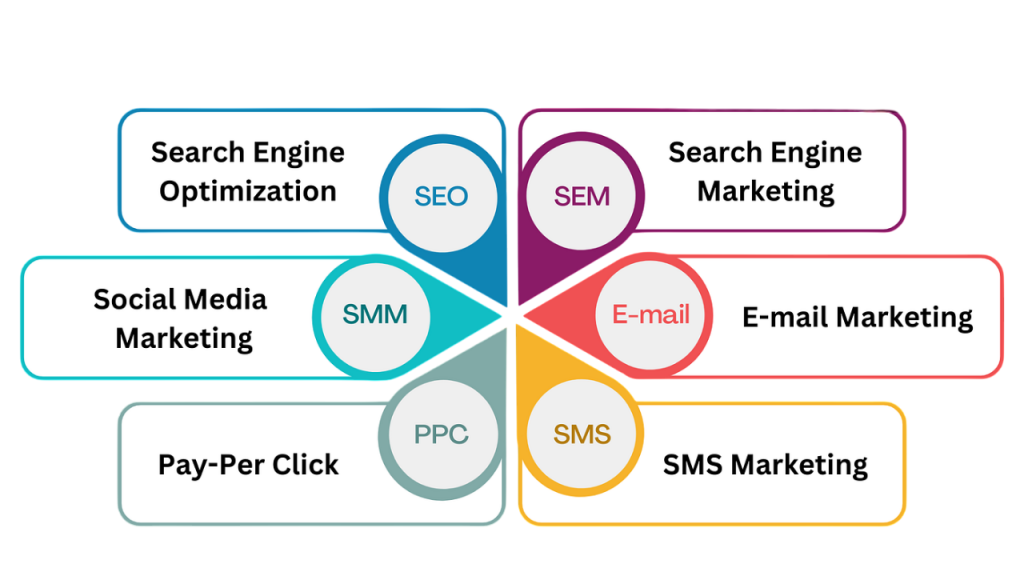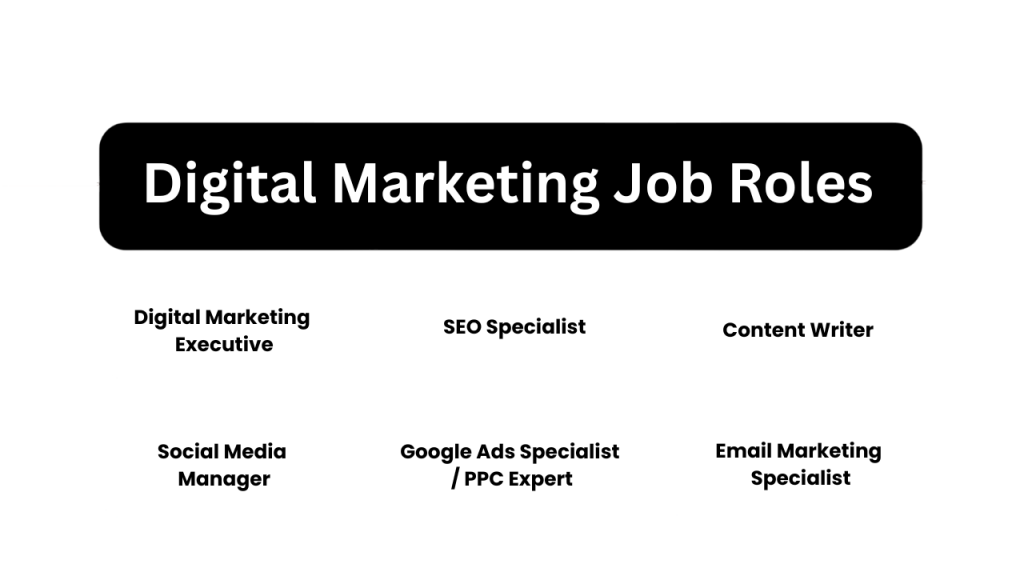
- What is a Career in Digital Marketing?
- Key Domains in Digital Marketing
- Required Skills & Qualifications
- Popular Job Roles
- Career Pathways & Growth
- Freelancing vs Agency vs In-house
- Certifications That Help
- Salary Expectations
- Conclusion
What is a Career in Digital Marketing?
A career in digital marketing refers to professional roles focused on promoting products, services, or brands through online channels. Unlike traditional marketing, Digital Marketing Training leverages platforms like search engines, social media, email, and websites to reach and engage with audiences. The growing digital footprint globally has created a high demand for skilled marketers who can strategize, execute, and optimize online campaigns. From creative storytelling to data analysis, the field offers a dynamic blend of artistic and analytical roles, making it a rewarding choice for individuals with diverse interests and skills.A career in digital marketing involves promoting products or services using online platforms such as social media, search engines, email, and websites. It combines creativity and data analysis to reach and engage target audiences effectively. Digital marketers develop strategies, create content, run advertising campaigns, and analyze performance to drive brand awareness, traffic, and sales. With the growing importance of the internet in business, digital marketing offers diverse roles like SEO specialist, content creator, social media manager, and paid ads expert. It’s a dynamic field that requires adaptability, creativity, and technical skills, offering excellent opportunities for growth and innovation.
Ready to Get Certified in Digital Marketing? Explore the Program Now Digital Marketing Online Training Offered By ACTE Right Now!
Key Domains in Digital Marketing
Domains in Digital Marketing encompasses several domains, each requiring unique skill sets. Search Engine Optimization (SEO) ensures that websites rank higher on search engines organically. Pay-Per-Click (PPC) advertising focuses on paid strategies to gain visibility and traffic. SEO Keyword Research Social Media Marketing (SMM) promotes engagement and brand awareness across platforms like Instagram, Facebook, and LinkedIn.

Content Marketing involves creating blogs, videos, and infographics to attract and retain customers. Email Marketing focuses on nurturing leads through targeted messaging. Affiliate Marketing and Influencer Marketing are also integral parts. Understanding these domains helps professionals specialize and align their interests with their career path.
Required Skills & Qualifications
- Basic Understanding of SEO and SEM: Knowledge of how search engines work and familiarity with SEO best practices.
- Analytical Skills: Ability to analyze data and draw insights using tools like Google Analytics or Google Search Console.
- Keyword Research: Experience or willingness to learn how to identify relevant keywords SEO Tips To Rule Google Maps to improve search rankings.
- Content Writing Skills: Basic writing ability to assist with creating or optimizing website content.
- Attention to Detail: Careful review of data and content to ensure accuracy and quality.
- Familiarity with Digital Marketing Tools: Exposure to platforms like Google Ads, SEMrush, or Moz is a plus.
- Good Communication Skills: Ability to work well within a team and clearly report findings or ideas.
- Eagerness to Learn: Willingness to stay updated with the latest trends and best practices in search marketing.
Popular Job Roles
Digital marketing offers a broad spectrum of job roles based on specialization. An SEO Specialist focuses on keyword research, link building, and technical site audits. PPC Analysts manage paid campaigns and optimize ad spend. Social Media Managers create content calendars, manage posts, and engage with followers. Content Writers and Strategists develop blog articles, eBooks, Types of Content Marketing and marketing copy. Email Marketing Specialists run drip campaigns, segment lists, and analyze open rates.

Digital Marketing Managers oversee overall strategy and team coordination. E-commerce Marketing Managers focus on increasing product sales through Amazon, Shopify, or brand websites. Roles like Marketing Automation Specialist and Conversion Rate Optimization (CRO) Expert are also emerging.Popular job roles in digital marketing span a wide range of specialties, each focusing on different aspects of online promotion and audience engagement. Key positions include SEO Specialists, who optimize websites to improve search engine rankings; Content Marketers, responsible for creating valuable and relevant content; and Social Media Managers, who build and maintain brand presence on social platforms. Other important roles include Pay-Per-Click (PPC) Specialists who manage paid advertising campaigns, Email Marketing Managers who nurture customer relationships through targeted emails, and Digital Analysts who interpret data to refine strategies. Additionally, Affiliate Marketers and Influencer Marketing Managers focus on partnership-driven promotions. These diverse roles offer opportunities for creativity, analysis, Digital Marketing Career and strategic planning within the digital marketing landscape.
To Explore Digital Marketing in Depth, Check Out Our Comprehensive Digital Marketing Training To Gain Insights From Our Experts!
Career Pathways & Growth
- Entry-Level Roles: Start as a marketing intern, assistant, or coordinator to gain foundational experience.
- Specialization: Focus on areas like SEO, content marketing, social media, PPC, or email marketing.
- Mid-Level Positions: Progress to roles such as Digital Marketing Specialist, Social Media Manager, or SEO Analyst.
- Senior Roles: Move up to positions like Digital Marketing Manager, Content Director, Digital Marketing Training or Paid Media Manager.
- Leadership & Strategy: Advance to leadership roles such as Marketing Director, Head of Digital, or Chief Marketing Officer (CMO).
- Continuous Learning: Stay updated with industry trends, certifications, and new tools to enhance skills.
- Cross-Functional Growth: Expand into related fields like data analytics, product marketing, or UX design.
- Entrepreneurship Opportunities: Use experience to start your own digital marketing agency or consultancy.
Freelancing vs Agency vs In-house
Freelancing
- Flexibility: Work independently with control over projects and schedule.
- Variety: Handle diverse clients and industries, gaining broad experience.
- Responsibility: Manage all aspects of work, from marketing to invoicing.
- Income: Income can be unpredictable; depends on client flow and rates.
- Team Environment: Collaborate with specialists across various marketing fields.
- Resources: Access to advanced tools and wider client portfolios.
- Learning: Exposure to multiple industries and marketing strategies.
- Pressure: Often fast-paced with tight deadlines and client demands.
- Focus: Dedicated to one company’s brand and goals, Video Marketing allowing deeper expertise.
- Stability: Typically offers consistent salary and benefits.
- Collaboration: Work closely with internal teams like sales and product.
- Limited Variety: May have less diversity in projects compared to agency or freelance work.
Agency
In-house
Looking to Master Digital Marketing? Discover the Digital Marketing Expert Masters Program Training Course Available at ACTE Now!
Certifications That Help
Certifications are critical in validating one’s skills in the digital marketing field. Industry-recognized certifications enhance credibility and improve job prospects. Google offers certifications in Analytics, Ads (Search, Display, Video), Google’s Match Type Changes and Shopping campaigns. HubSpot’s certifications in inbound marketing, content marketing, and email marketing are valuable for beginners and professionals alike. Meta (Facebook) Blueprint offers certifications for social media advertisers. SEMrush, Moz, and Hootsuite also offer niche credentials. Completing these not only deepens knowledge but also signals to employers that you are serious about your growth and staying updated with industry standards.Certifications play a significant role in building a successful career in digital marketing by validating your skills and knowledge to employers and clients. Earning recognized certifications from reputable platforms such as Google, HubSpot, Facebook, and SEMrush can boost your credibility and help you stand out in a competitive job market. These certifications cover essential areas like SEO, content marketing, social media advertising, pay-per-click (PPC), and analytics. They not only provide up-to-date industry knowledge but also demonstrate your commitment to professional growth. Whether you’re a beginner or looking to specialize, certifications can open doors to new opportunities and help accelerate your career advancement in digital marketing.
Salary Expectations
Digital marketing salaries vary widely based on role, experience, geography, and company size. In India, a fresher can earn between ₹3 LPA to ₹5 LPA as a Digital Marketing Executive. Mid-level professionals in roles like SEO Specialist or Social Media Manager can expect ₹6 LPA to ₹10 LPA. Digital Marketing Managers earn anywhere from ₹10 LPA to ₹20 LPA, depending on performance and company size. In countries like the US or UK, salaries are higher, with average entry-level salaries around $50,000 annually. Freelancers can earn variable income ranging from ₹25,000/month for beginners to ₹2,00,000+/month for experienced consultants depending on client size and scope of work.Salary expectations in digital marketing can vary widely based on factors such as experience, location, job role, and the size of the company. Entry-level positions like marketing assistants or interns typically earn modest salaries but gain valuable experience to advance their careers. As professionals specialize and gain expertise in areas like SEO, social media, Inbound Marketing or paid advertising, their earning potential increases significantly. Mid-level roles such as Digital Marketing Specialists or Managers often command competitive salaries, reflecting their skills and impact on business growth. Additionally, working in larger cities or for well-established companies usually offers higher pay. Continuous learning and certifications can further boost salary prospects, making digital marketing a rewarding career financially.
Preparing for Digital Marketing Job Interviews? Have a Look at Our Blog on Digital Marketing Interview Questions and Answers To Ace Your Interview!
Conclusion
In conclusion, Digital Marketing Career offers a dynamic and rewarding career path with diverse opportunities across freelancing, agencies, and in-house roles. By developing key skills, gaining relevant certifications, Digital Marketing Training and understanding industry trends, professionals can build successful careers and enjoy competitive salaries. Whether you choose to specialize in SEO, social media, content creation, or paid advertising, continuous learning and adaptability are essential for growth. With the digital landscape constantly evolving, those who stay proactive and embrace new technologies will find lasting success and the chance to make a significant impact in the marketing world.




